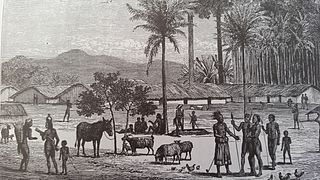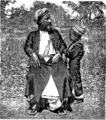
Swahili, also known by its local name Kiswahili, is a Bantu language originally spoken by the Swahili people, who are found primarily in Tanzania, Kenya, and Mozambique. Estimates of the number of Swahili speakers, including both native and second-language speakers, vary widely. They generally range from 150 million to 250 million; with most of its native speakers residing in Tanzania.

Sunni Islam is the largest branch of Islam, followed by 85–90% of the world's Muslims, and simultaneously the largest religious denomination in the world. Its name comes from the word Sunnah, referring to the tradition of Muhammad. The differences between Sunni and Shia Muslims arose from a disagreement over the succession to Muhammad and subsequently acquired broader political significance, as well as theological and juridical dimensions. According to Sunni traditions, Muhammad left no successor and the participants of the Saqifah event appointed Abu Bakr as the next-in-line. This contrasts with the Shia view, which holds that Muhammad appointed his son-in-law and cousin Ali ibn Abi Talib as his successor.

Tanzania, officially the United Republic of Tanzania, is a country in East Africa within the African Great Lakes region. It is bordered by Uganda to the northwest; Kenya to the northeast; the Indian Ocean to the east; Mozambique and Malawi to the south; Zambia to the southwest; and Rwanda, Burundi, and the Democratic Republic of the Congo to the west. According to the 2022 national census, Tanzania has a population of around 62 million, making it the most populous country located entirely south of the equator.

Zanzibar is an insular semi-autonomous region which united with Tanganyika in 1964 to form the United Republic of Tanzania. It is an archipelago in the Indian Ocean, 25–50 km (16–31 mi) off the coast of the African mainland, and consists of many small islands and two large ones: Unguja and Pemba Island. The capital is Zanzibar City, located on the island of Unguja. Its historic centre, Stone Town, is a World Heritage Site.

Pemba Island is a Tanzanian island forming part of the Zanzibar Archipelago, lying within the Swahili Coast in the Indian Ocean.
The Swahili people comprise mainly Bantu, Afro-Arab, and Comorian ethnic groups inhabiting the Swahili coast, an area encompassing the Zanzibar archipelago and mainland Tanzania's seaboard, littoral Kenya, the Comoros Islands, and northwest Madagascar.
The Zaramo people, also referred to as Dzalamo or Saramo, are a Bantu ethnic group native to the central eastern coast of Tanzania, particularly Dar es Salaam Region and Pwani Region. They are the largest ethnic group in and around Dar es Salaam, the former capital of Tanzania and the 7th largest city in Africa. Estimated to be about 0.7 million people, over 98% of them are Muslims, more specifically the Shafi'i school of Sunni Islam. Zaramo people are considered influential in Tanzania popular culture, with musical genres like Sengeli originating from their community in Kinondoni District. Their culture and history have been shaped by their dwelling in both urban and rural landscapes.

Kenya has a Christian majority, with Islam being the second largest faith representing 11% of the Kenyan population, or approximately 5.2 million people as of the 2019 census. The Kenyan coast is mostly populated by Muslims. Nairobi has several mosques and a notable Muslim population. The faith was introduced by merchants visiting the Swahili coast, which led to local conversions and foreign Muslims becoming assimilated. This would later result in the emergence of several officially Muslim political entities in the region.

Manyema (WaManyema) (Una-Ma-Nyema, eaters of flesh) are a Bantu ethnic group, described in the past as powerful and warlike, in the African Great Lakes region of Eastern Africa and Central Africa.

Islam in Africa is the continent's second most widely professed faith behind Christianity. Africa was the first continent into which Islam spread from the Middle East, during the early 7th century CE. Almost one-third of the world's Muslim population resides in Africa. Muslims crossed current Djibouti and Somalia to seek refuge in present-day Eritrea and Ethiopia during the Hijrah ("Migration") to the Christian Kingdom of Aksum. Like the vast majority (90%) of Muslims in the world, most Muslims in Africa are also Sunni Muslims; the complexity of Islam in Africa is revealed in the various schools of thought, traditions, and voices in many African countries. Many African ethnicities, mostly in the northern half of the continent, consider Islam as their traditional religion. The practice of Islam on the continent is not static and is constantly being reshaped by prevalent social, economic, and political conditions. Generally Islam in Africa often adapted to African cultural contexts and belief systems forming Africa's own orthodoxies.

Swahili culture is the culture of the Swahili people inhabiting the Swahili coast. This littoral area encompasses Tanzania, Kenya, and Mozambique, as well as the adjacent islands of Zanzibar and Comoros along with some parts of Malawi and the eastern part of Democratic Republic of Congo. Swahili people speak Swahili as their native language, which belongs to the Bantu language family. Graham Connah described Swahili culture as at least partially urban, mercantile, and literate.

Tanzania is a Christian majority nation, with Islam being the largest minority faith in the country. According to a 2020 estimate by Pew research center, Muslims represent 34.1% of the total population. The faith was introduced by merchants visiting the Swahili coast, as it became connected to a larger maritime trade network dominated by Muslims. This would lead to local conversions and assimilations of foreign Muslims, ultimately causing the eventual formation of several officially Muslim political entities in the region. According to the Association of Religion Data Archives (ARDA), 55.3% of the population is Christian, 31.5% is Muslim, 11.3% practices traditional faiths, while 1.9% of the population is non-religious or adheres to other faiths as of 2020. The ARDA estimates that most Tanzanian Muslims are Sunni, with a small Shia minority, as of 2020.

The Swahili coast is a coastal area of East Africa, bordered by the Indian Ocean and inhabited by the Swahili people. It includes Sofala ; Mombasa, Gede, Pate Island, Lamu, and Malindi ; and Dar es Salaam and Kilwa. In addition, several coastal islands are included in the Swahili coast, such as Zanzibar and Comoros.

Tumbatu is a historic Swahili settlement located on Tumbatu Island, Kaskazini A District of Unguja North Region in Tanzania. This site is a significant archaeological site that contains a large number of collapsed coral stone structures including private houses and several mosques, the largest of which is located on the shore facing the village of Mkokotoni on Unguja. Pearce initially looked into the ruins in 1915 and wrote about the mosques, palace, and other stone homes.
‘Abd al-‘Azīz al-Amawī (Arabic: عبد العزيز الأموي; 1838–1896) was a Somali scholar following the Shāfi‘ī school of jurisprudence and the Ash'arite school of theology, and was a Sufi shaykh of the Qādiryya Sufi order, of which he established his own branch. He was also adviser to several sultans of Zanzibar.
The Shirazi people, also known as Mbwera, are a Bantu ethnic group inhabiting the Swahili coast and the nearby Indian ocean islands. They are particularly concentrated on the islands of Zanzibar, Pemba and Comoros.

Abdilahi Nassir was a Kenyan Shia cleric based in Mombasa. Though raised a Sunni, Nassir converted to Shiism, and in the wake of Iran's Islamic revolution publicly identified himself as Twelver Shia.

Pemba Island is a large coral island off the coast of Tanzania. Inhabited by Bantu settlers from the Tanga coast since 600 AD, the island has a rich trading, agricultural, and religious history that has contributed to the studies of the Swahili Coast trade throughout the Indian Ocean.
Freedom of religion in Tanzania refers to the extent to which people in Tanzania are freely able to practice their religious beliefs, taking into account both government policies and societal attitudes toward religious groups.
Zanzibari independence is a political ambition of some political parties, advocacy groups, and individuals of Zanzibar, a semi-autonomous region territory within Tanzania, to become an independent sovereign state.

















